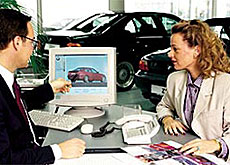Car cartels head for the scrap heap

Switzerland looks set to follow the European Union and outlaw price fixing in the car market.
The Competition Commission is considering whether to take similar action – a move that would bring down the price of cars.
Organisations representing the car industry in Switzerland have been campaigning heavily against the dismantling of their cartels.
But it has been a bad summer for Swiss car importers and dealers. At the end of August the Competition Commission sent out a consultation paper in which it proposed an end to car cartels.
In mid-September, the Swiss parliament decided to revise the law on cartels and set their sights on, amongst other things, tackling vertical price fixing.
So-called vertical price fixing is central to the Swiss car market. It means a car dealer is forbidden from putting cars from different importers in the same showroom.
Swiss car dealers also have go through the official importer of a certain car make and are not allowed to shop for cheaper versions abroad. Spare parts may only be bought through the approved importer.
And it is the Swiss consumer who suffers the most from this system, paying above the average for their cars or repairs.
The EU goes ahead
But this is not just a Swiss problem, as the same cartel system was in operation in the EU until just recently.
On October 1, Mario Monti, the EU’s cartel commissioner, phased out the so-called “block exemption” regulation.
Block exemption had effectively legalised car cartels for 17 years and allowed European car manufacturers to build up a network of customer-friendly businesses.
According to the EU, existing contracts will have to be adapted to the new law within the next six months.
The Competition Commission aims to take similar measures to the EU, so that in future, Switzerland will not remain an expensive island for cars in a sea of cheaper EU countries.
“Switzerland would become insular [if it did not act] because of the anti-competition rules of the EU – by far our most important trading partner,” Patrick Krauskopf, the vice-director of the Competition Commission told swissinfo.
Krauskopf added that for Switzerland, a country without its own car production industry, a move away from EU competition rules would be inadvisable.
“Parliament has given a clear signal with its decision [to get tough on cartels] and also increase the Competition Commission’s effectiveness,” he said.
Opposition from the car industry
But these initiatives have met with heavy opposition from the car trade, who fear a dramatic collapse in the sector’s growth.
The industry points out that more than 80 per cent of car dealers in Switzerland are small and medium-sized business and are often family run. It considers these dealers to be most at risk from any changes to the current system.
Swiss-Auto, the association of Swiss car importers, has given its response to the competition commission, but its position remains a secret.
“No comment until the consultation is over,” the association told swissinfo.
Fears of going out of business
The Swiss union of professional car dealers has also clammed up. But it has made public its total rejection of the Competition Commission’s proposal.
Union leader Roland Ayer is especially afraid that the “present structure of the industry will be totally called into question and in reality will be completely ruined”.
Ayer added that the Competition Commission “had once again followed European developments… but its own solution goes far beyond the EU guidelines”.
This is a view rebuffed by Krauskopf: “We are not holier than the Pope. We are not going further than the EU.”
For him the fear that car dealers will go out of business is unfounded. He thinks that a loosening of the competition laws would give small and medium-sized businesses more leeway in the market, for example with car deliveries.
“Whoever is good and innovative can profit from it,” he said.
No car hire companies
The car trade is also afraid that strong competitors could break into the Swiss market, such as large car hire companies.
But these fears seem to be exaggerated since car hire companies already sell most of their cars to the second-hand market and, besides, they do not see a particular gap in the market in Switzerland
“We prefer to sell to second-hand dealers, who do not need to come three times with their wife in order to look at the colour,” said a manager of a large Swiss car hire firm.
The Competition Commission will present its findings on Monday. If new rules come into force, they would apply immediately for new contracts between businesses and importers.
Krauskopf thinks there would be a deadline of one or two years for existing agreements.
swissinfo, Phillippe Kopf, translated by Isobel Johnson
Switzerland could follow the European Union and outlaw price fixing in the car market.
At the end of August the Competition Commission sent out a consultation paper in which it proposed an end to car cartels.
In mid-September, the Swiss parliament decided to revise the law on cartels.
Organisations representing the car industry in Switzerland have been campaigning heavily against the dismantling of their cartels.

In compliance with the JTI standards
More: SWI swissinfo.ch certified by the Journalism Trust Initiative









You can find an overview of ongoing debates with our journalists here . Please join us!
If you want to start a conversation about a topic raised in this article or want to report factual errors, email us at english@swissinfo.ch.